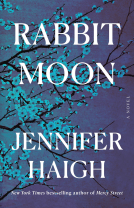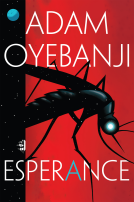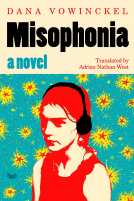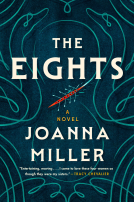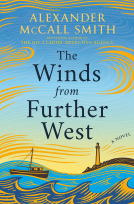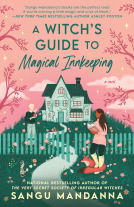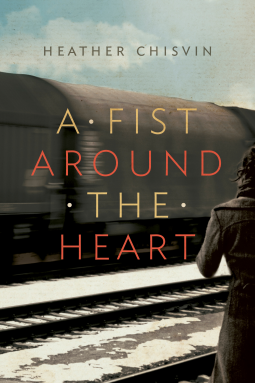
A Fist Around the Heart
by Heather Chisvin
This title was previously available on NetGalley and is now archived.
Send NetGalley books directly to your Kindle or Kindle app
1
To read on a Kindle or Kindle app, please add kindle@netgalley.com as an approved email address to receive files in your Amazon account. Click here for step-by-step instructions.
2
Also find your Kindle email address within your Amazon account, and enter it here.
Pub Date Apr 10 2018 | Archive Date Apr 30 2018
Talking about this book? Use #AFistAroundTheHeart #NetGalley. More hashtag tips!
Description
A Note From the Publisher
Available Editions
| EDITION | Other Format |
| ISBN | 9781772600650 |
| PRICE | $19.95 (USD) |
Featured Reviews
 Monica M, Book Trade Professional
Monica M, Book Trade Professional
The pacing of this novel was perfect—in the wake of her sister's apparent suicide, an elderly woman retraces her sister's life, and examines her own in the process. The quiet curiousity of the narrator drove the plot, and the characters felt well-rounded.
Two Russian Jewish sisters were sent to Winnipeg during the Anti-Jewish pogroms in the Russian Empire following the assassination of Tsar Alexander II in 1881. Esther, the older sister, spends her entire life in Winnipeg, occasionally experiencing episodes of mental illness; Anna, younger by four years, moves to New York City and ends up being a women’s rights activist there. In 1942, Esther returns to Winnipeg when she learns her sister has died in an apparent suicide. Having difficulty believing Esther took her own life, Anna reads Esther’s journals and examines her own memories of key events which shaped her life and that of her sister.
The novel covers just over 60 years, and it is obvious that the author did considerable historical research. I enjoyed learning about the California Perfume Company, womb veils, and If Day in Winnipeg. Historical figures like Margaret Sanger make cameo appearances. Sometimes, however, it felt as if the scope of the book is too broad and the examination of historical events is rather superficial. Anna finds herself in St. Petersburg in 1918, about a year after the Russian Revolution, but little information is given about the Russian political situation; the reader is left to figure out Bolsheviks and Mensheviks and Chekists. (Would a Russian nobleman support Bolshevism? Anna, for example, attributes her Bolshevik sympathies to her stepfather, an émigré Russian Count? She tells a Bolshevik, “’If it weren’t for [Count Chernovski] I wouldn’t be who I am today. I wouldn’t be nearly as sympathetic to your cause’”?)
Anna is not always a credible character. When she arrives in Canada, she is 5 years old. When she is 9 or 10, she is already spending her time, “reading about Grace Greenwood and Nellie Bly; articles on workers’ rights and sexual freedom and the vote for women”? At that age she can read Harper’s New Monthly and Century Magazine in her second language? She is only 15 when she finds herself in a situation that has her moving to Manhattan? What a precocious young girl!
There are some other implausible events which irk. That Nathaniel, Anna’s neighbour and friend in Russia, remains her friend in Canada seems unlikely. He lives in the north end of Winnipeg, in New Jerusalem, and she lives in the west end, in Armstrong’s Point. How would they have found each other? And Anna, a young girl living in a sheltered world where “there were rules of etiquette for everything,” is just allowed to wander around the city with Nathaniel? The officer in charge of the investigation into Esther’s death tells Anna, “’I thought you might want to look around [Esther’s house] before the police team goes through. We’ll be restricting access to the property at that time.’” He lets her into Esther’s home even though he says, “’We don’t want anyone going in until the investigation is over’”? He even tells her, “’You can do whatever you want.’” I guess police investigative procedures were very different in 1942? And then there’s the evasion of a plot problem. When a friend uncovers Anna’s deep secret, she asks how he found out and he replies, “’Anna. Don’t ask me that. It took years.’” Oh please!
The relationship between the sisters is interesting. Anna looks after her older but more fragile sister for the longest time but eventually becomes torn between taking care of Esther and escaping her. That is the pattern that emerges throughout Anna’s adult life. She convinces herself not to worry about Esther and to focus on her own life. This type of behaviour is understandable though it doesn’t always make Anna an admirable character. Anna knows Esther’s diagnosis for about 20 years, yet allows a situation where “After an initial flurry of letters and phone calls, our correspondence got spotty again”?
There is an interesting story here, but the telling is sometimes muddled. The eventual explanation for Esther’s death is certainly original. I just wish there were a less scattered structure so the novel’s potential could be better realized.
Note: I received a digital ARC of this book from the publisher via NetGalley.
Good parts: This book touched on a good bit of history from the 1890s to the 1930s (in Russia and the US) without you even realizing it. I thought the author weaved it into the story so well; it didn’t feel like a forced history lesson. I also thought the main character’s sister (Esther) had an interesting story. Her character seemed much more developed, and I probably would have given it four stars had the book been more about her.
Not so great parts for me: I didn’t like Anna, the main character. While she was generous with strangers, she continually neglected her family (with a few rare exceptions)—and the book, in my opinion, never gave any good answer as to why.
Overall, I found the book to be interesting but just okay. I think with more development of Anna the book could have been great.
 Madhuri P, Reviewer
Madhuri P, Reviewer
I never had a sister but I always wished I had one because I always thought I wouldn't have to look outside for a best friend and an ally if I had a sister. The story revolves around two sisters Anna and Esther who born in Russia but sent to live in Winnipeg with the Count and Countess. Esther is elder to Anna, beautiful but emotionally disturbed. Anna is the younger one, tall, but stronger with independent ideas. Esther has her episodes now and then and Anna is always there to support her. Anna is shocked by Esther's sudden death. The bond between the two sisters is incredibly written. This is not the kind of bond I assumed of with my imaginary sister, but its very different. They are two different people but the sisterhood always brings them together. They are always there for each other whenever there is a significant incident in their lives. Anna's rebellious nature attracted me. She does what she likes. Anna and Esther both had troubled childhood when they were taken away from their parents, but they both did their part to the less fortunate by volunteering at various causes. The Count and the Countess were of great influence. Many other supporting characters like Vera, the police inspector, Nathaniel, Oscar are well written.
The books took me through the whole Great War period, the If Day and how Jews were affected during that time. I could say this is a historical book. I felt that the book ended too soon. I'm sure the author has her reasons. All in all, I enjoyed the book. I look forward to reading more books from Heather Chisvin.
#afistaroundtheheart #theclippednightingale #barnesandnoble #netgalley #goodreads #chapters #plumreview #kindle #bookreview #bookreviewer #heatherchisvin
 Polly K, Reviewer
Polly K, Reviewer
A well-written, poignant story about 2 Russian sisters, and the diverse way they handled a new life in Canada post-Bolshevik Russia. Anna is torn between handling the mental illness of her sister, Esther, and making a new life for herself. The many twists and turns in this novel are well done, making this one of my top reads for 2018.
 Janette M, Librarian
Janette M, Librarian
A historical fiction novel reminding us the persecution of Jews was not only WW II, but also in Russia where this novel takes place. We are also reminded even as Jewish women were considered animals, soldiers had no issues with taking advantage of them, even children. The ramifications of this abuse lasts a lifetime. While the theme was excellent, the book itself felt like it stayed on top of the issues and didn't delve as deep as the author easily could have.
 Jasmine A, Reviewer
Jasmine A, Reviewer
A Fist Around the Heart follows two sisters who are sent away by their mother in order to keep them safe in a time of heightened anti-Semitism. Both sisters, though together as they grow up, have very different experiences while living with their new 'parents'. Esther develops a severe case of mental illness, while Anna attempts to forge relationships with countless men. In the present day, Anna discovers that Esther has died, and it has been ruled a suicide, yet Anna doesn't believe her sister was ever in a suicidal position. It's a tale which explores the way two sisters drifted apart, and an exploration of the role of women during the war.
A LOT happened in 240 pages, but it wasn't necessarily fast-paced. There wasn't really any action, just lots of mystery and uncovering secrets. I really did enjoy this. I think I'm developing a newfound appreciation for certain historical fiction. The story was a little confusing at times; it constantly jumped between memories and present day - there was no chronological order to the story, which made it a little hard to follow. The story was definitely interesting though. I felt quite emotional at times, and certain parts were definite shockers.
TRIGGER WARNINGS: suicide, mental health, rape
A great book with a heart-wrenching story.
 Gillian E, Educator
Gillian E, Educator
A well-written, poignant story about 2 Russian sisters, and the way they handled their new life in Winnipeg post-Bolshevik Russia. Anna is dealing with the mental illness of her sister, Esther, and trying to make a new life for herself. This is a book with a mystery that slowly unfolds. The story is well written descriptive and often sad. I recommend this book.
This is such a surprising book, one filled with layers inside layers and new revelations at every turn. Moving back and forth from WWII-era New York and Winnipeg and a Russian shtetl in the 1880s, and many points in between, it doesn’t offer the chronological path of a standard historical novel. However, its flow feels natural, like the unspooling of memories from a remarkable life.
In 1942, Anna Grieve, a well-off career woman in her sixties and longtime Manhattan resident, has just put her older sister Esther on a train back to Winnipeg after an enjoyable, long-awaited visit. Following Esther’s arrival home on “If Day,” the date of a simulated Nazi invasion, Anna receives a call from a policeman that Esther is dead; she’d walked in front of a moving train, an apparent suicide. Esther, a widowed society matron, had had episodes of mental instability from childhood on—periods when she seemed tuned out from reality—although she’d seemed fine during her stay.
As Anna herself returns to Winnipeg for answers, a mystery unfolds, drawing in reminiscences of both women’s earlier lives. In 1881, when Anna was five and Esther ten, their frightened parents, fearing anti-Semitic retaliation after Tsar Alexander II’s assassination, sent the girls away from Russia with her mother’s aristocratic employers. On their transatlantic voyage, young Anna’s confusion is palpable. Despite a comfortable upbringing, with an adoptive father who respects her intelligence, Anna worries continuously about her fragile, ethereally beautiful sister.
Anna is a woman of astonishing courage and hidden complexities. She forms friendships, has several love affairs, and participates in the early birth control movement alongside Margaret Sanger. Chisvin brings this setting alive with vibrant ease. One of Anna’s later travels feels a bit contrived, but this debut is a fine literary mystery with an insightful look at an unusual sisterly relationship.
(from the Historical Novels Review, May 2018)
Anna receives a call about her sister. She is dead! Run over by a train. Was she pushed? Was this suicide?
Anna’s sister, Esther, is a damaged soul. Anna and Esther are given, by their mother, to a Count and Countess of Russia to be taken to safety at the beginning of the Russian revolution. Nothing is ever the same. Anna begins to rebel and Esther is prone to bouts of melancholy and mental detachments.
This story is narrated by Anna. And I love her tenacity, her hard work and her politics. Anna is a smart, sell sufficient woman in a time period where women are supposed to be homemakers only. She also secretly provides birth control. Keep in mind, this is when it was illegal for women to have birth control. Did I mention Anna is a REBEL?!?
Then there is Esther. Anna and Esther have a strange relationship. They are estranged through part of the story. But, the moment Esther needs her, Anna always comes through.
There is a lot of history and mystery in this book. It does flip flop between Anna’s past and her present. This can get a little confusing in places. But, the story keeps you captivated.
I received this novel from Netgalley for a honest review.
I already want to thank the Netgalley website for allowing me to read this book.
On the cover we see Anna on the platform of a train station. It all began in the 1880s when Anna's mother and Esther sent them to Winnipeg after many persecutions of Jews. Each governs differently to his new life. Anna knows that her sister is suffering from this but she will have to leave and after a while she learns that her sister Esther has committed suicide. She will try to find out more about her suicide.
A historical fiction filled with suspense and twists with endearing and moving characters. I recommand it.
 Lael B, Reviewer
Lael B, Reviewer
Anna “Bencke” Grieve’s life changed after Tsar Alexander II’s assassination. In fear for their lives as Jews, her mother, a privileged servant, asked her employers Count and Countess Chernovski to take Bencke and her older sister Esther with them to Canada. The Chernovski’s later adopt them, believing their parents to be dead. Bencke does her best to care for Esther, who suffers episodes from traumatic memories that incapacitate her at times, as she herself tries to fit her eccentric personality into Countess Chernovski’s picture perfect household. Decades later, Anna receives a phone call from the Winnipeg police informing her that her sister has committed suicide by stepping in front of a train. She heads to Canada seeking the truth. The story alternates between this investigation and a backstory of a life fully lived, from Anna’s forced relocation to NYC, to circumstances causing her to be deported to Russia during WWI. In the investigation, Anna learns her sister’s secrets and must live with them now.
Chisvin brings history to life in Anna’s story, as dear reader sees her torn from her family as a child after her country’s leader is killed and Jews are blamed, and as an activist for women’s rights alongside Margaret Sanger. She becomes a part of the melting pot that is NYC, falls into the fear of Americans who deport her in the war, and witnesses the disorder of Russia as essentially an outsider. Chisvin brings closure to Anna in her mixed emotions of finally being free of her sister as it breaks her heart. The last line of the book is brilliant in its imagery of this closure.
I was fortunate to receive a digital copy of this beautiful story from the publisher through NetGalley.
I posted my review on my website and shared it on FB, Twitter, GR, and B&N.



